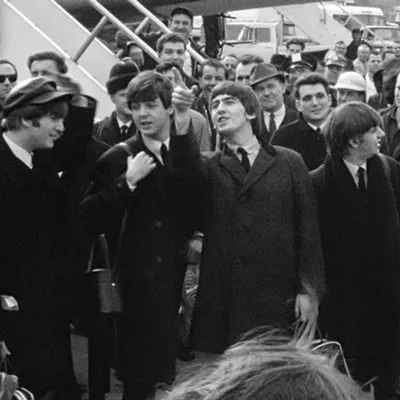Francis Ford Coppola's Megalopolis opens with an epigraph that addresses the fate of humankind in the form of a question, yet the onscreen text ends in a comma rather than a question mark. That apparent typo sets the stage for the movie to come: a grandiose epic with sweeping but muddled ideas that frequently loses sight of basic coherence. Coppola famously spent $120 million of his own money to produce the passion project that he's had in mind since the 1970s, and it's hard not to admire the ambition of a man in his 80s sticking to such an uncompromising vision.
That's not the same thing as making a good movie, though. As the director of multiple all-time masterpieces — including The Godfather, The Godfather Part II, The Conversation and Apocalypse Now — Coppola has earned his place in the filmmaking pantheon, but he's equally known for unwieldy boondoggles like One From the Heart and The Cotton Club. Megalopolis is 100 percent boondoggle, which makes it both fascinating and frustrating, often coming across like the ravings of a wealthy, entitled madman. For some viewers, that may be part of the appeal, but only the most adventurous rubberneckers should bother with this train wreck.
Coppola's resources and reputation have allowed him to assemble an impressive, eclectic cast, starting with Adam Driver as Cesar Catilina, a superstar architect in the semi-futuristic city of New Rome, an alternate-universe version of New York City crossed with the latter days of the Roman Empire. Cesar is in charge of something called the Design Authority, which gives him domain over new construction in the city, and puts him in direct conflict with the mayor, Frank Cicero (Giancarlo Esposito). Like Coppola, Cesar has a grand yet misunderstood vision for a massive project, something he calls Megalopolis.
It's basically high-tech gentrification, but the movie holds Cesar up as a benevolent overlord, with Frank and everyone else who opposes Cesar as misguided at best, corrupt at worst. Cesar is like a combination of Tony Stark and Howard Roark from Ayn Rand's The Fountainhead, although the movie more closely resembles the low-budget right-wing trilogy based on Rand's Atlas Shrugged. Despite sparing no expense, Coppola still ends up with surprisingly chintzy-looking special effects, and the performances range from stilted to deranged, with each actor seemingly performing in an entirely different film.
Rather than evoke Coppola's classics, Megalopolis feels more like a $120 million Neil Breen movie, echoing the laughable self-importance of the cult bad-movie auteur. Laurence Fishburne narrates Megalopolis as Cesar's right-hand man Fundi Romaine, delivering a lot of pompous pronouncements without saying much of anything. As Cesar's jealous, conniving cousin Clodio Pulcher, Shia LaBeouf uses empty populist rhetoric to assemble an army of thugs in red baseball caps, but if there's a specific political message, it gets lost in all the esoteric rambling. At one point, Cesar stops to deliver the entire "To be or not to be" soliloquy from Hamlet.
All of the confusing sci-fi elements (Cesar also has the ability to occasionally stop time, for some reason) and ponderous social commentary gets subsumed by a gooey, unconvincing love story between Cesar and Cicero's daughter Julia (Nathalie Emmanuel), who represents a kind of female purity that Cesar relies on so he can be free to take on his masculine pursuits of legacy-building. She's a stand-in for the late wife who provides Cesar's tragic backstory, in one of many subplots that ultimately amount to nothing. Although Emmanuel has nearly as much screen time as Driver, she mostly seems lost, and she's consistently overshadowed by Aubrey Plaza as Cesar's previous love interest, a social-climbing TV journalist with the improbable name of Wow Platinum.
At least Plaza seems to be having fun, playing up her character's sexual gamesmanship like she's in a campy soap opera — which she essentially is. It's appropriate that Saturday Night Live's Chloe Fineman appears in a small role, since Megalopolis is often indistinguishable from a sketch-comedy parody of itself. Every glimpse of Cesar's brilliant plan for the city makes it look more and more like a joke, yet the movie keeps doubling down on the idea that everyone in the city, from his rich and powerful rivals to the poor people his project would displace, should step aside and give Cesar free rein to remake New Rome in his image.
Shot mostly on soundstages in Georgia, Megalopolis has the hermetically sealed feel of the ersatz Las Vegas in One From the Heart, but it doesn't give New York the same mythical quality that movie imparted to Vegas. Instead of creating an insightful hybrid version of NYC, Coppola mostly walls his characters off in confined spaces. Midway through the movie, there's a nuclear satellite crash that destroys a substantial portion of the city, and it barely registers for either the characters or the audience.
By that point, though, it's hard to tell exactly what is meant to register, as Coppola lets the movie increasingly spin out of control. That's still often more compelling to watch than a competent but soulless blockbuster — but then again, so are plenty of cinematic disasters.♦
![]() Megalopolis
Megalopolis


















